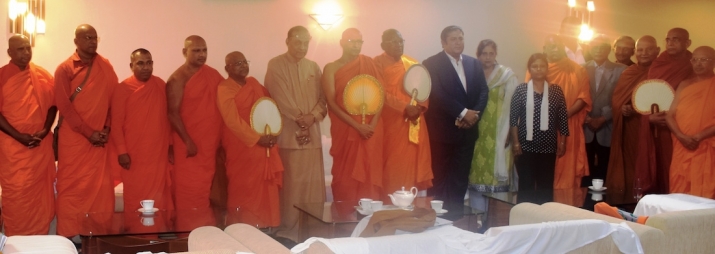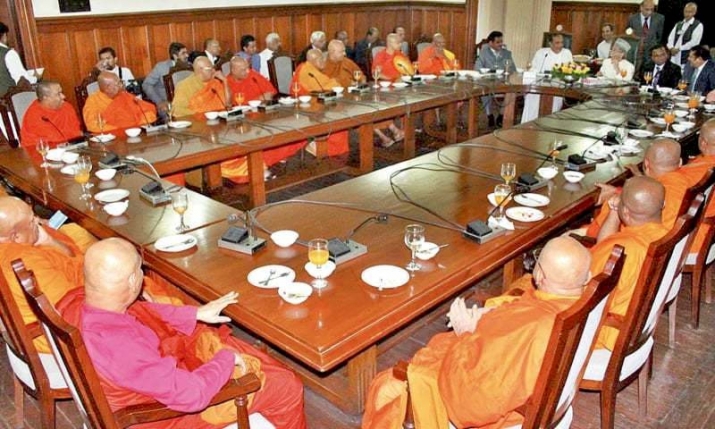NEWS
Buddhist Delegation From Sri Lanka Visits Pakistan to Cement Cultural Ties
 A delegation of 40 senior Buddhist monks and scholars from Sri Lanka is in Pakistan from 18–25 April. From paksianhc.lk
A delegation of 40 senior Buddhist monks and scholars from Sri Lanka is in Pakistan from 18–25 April. From paksianhc.lkA delegation of 40 senior Buddhist monks and scholars from Sri Lanka has arrived in Pakistan for a week-long visit that is part of an initiative aimed at introducing the people of Sri Lanka to Pakistan’s rich Buddhist history and reviving the heritage of Pakistan’s “Gandhara Trail,” the cultural and commercial hub of which was located at the present day town of Taxila, now a UNESCO World Heritage Site.
The Gandhara Trail was part of the ancient Silk Road network of trade routes that linked the civilizations of East Asia and extended as far west as the Mediterranean Sea, enabling cultural and religious exchange between civilizations and peoples as well as commerce.
Buddhism first took root in Pakistan some 2,300 years ago under the Mauryan emperor Ashoka (r. c. 268–c. 232 BCE), who ruled almost the entire Indian subcontinent and propagated Buddhism across the region. The Gandharan civilization flourished in northwestern Pakistan from the 6th century BCE to the 5th Century CE. Gandhara was the name given to the old kingdom of Peshawar, which encompasses the Swat Valley, Taxila, Buner, and Bajaur regions of Pakistan, as well as the Jalalabad District of present-day Afghanistan.
The visiting party, which includes senior representatives of all Buddhist chapters in Sri Lanka and is led by the speaker of Sri Lanka’s parliament, Karu Jayasuriya, and Justice Minister Wijeyadasa Rajapakshe, is scheduled to visit various sites of Buddhist significance in Pakistan, including Mardan, Takht-i-Bahi, and Swat, as well as museums in Lahore, Taxila, and Peshawar housing rare Buddhist relics and antiquities. The delegates will also hold meetings with high-level Pakistani officials, including President Mamnoon Hussain, senate chairman Raza Rabbani, and Religious Affairs Minister Sardar Muhammad Yousaf.
Gandhara is understood to have been predominantly Mahayana Buddhist, but also included a strong community of Vajrayana Buddhists. According to some accounts, the 8th century Buddhist teacher Padmasambhava, who introduced Buddhism to Tibet and is popularly known as Guru Rinpoche, was born in a village near the present-day town of Chakdara, which was then a part of Oddiyana and is often cited as being located in the Swat Valley.
 The visiting party, which includes senior representatives of all Buddhist chapters in Sri Lanka, will also hold meetings with high-level Pakistani officials. From dawn.com
The visiting party, which includes senior representatives of all Buddhist chapters in Sri Lanka, will also hold meetings with high-level Pakistani officials. From dawn.comGandharan art may have been the first to depict images of the Buddha, most of them enshrined in monasteries and stupas. Buddhism, Jainism, Hinduism, and Zoroastrianism existed side by side in the region, which was known for its Graeco-Indian artistic and cultural identity, a legacy of Alexander the Great. The Macedonian king conquered the region in the 4th century BCE and was succeeded by a number of Graeco-Indian kings. Over the centuries it became an entrepôt of trade, both overland and via the sea.
According to estimates for 2010 from the Washington, DC-based Pew Research Center, 96.4 per cent of Pakistan’s population identify as Muslim, with Buddhists making up less than 1 per cent. Despite being a predominantly Muslim country, Pakistan has meticulously preserved much of its rich Buddhist heritage, including sites and artifacts of historical significance.
See more
Speaker of Sri Lanka Parliament leads senior monks, scholars to revive Pakistan's Gandhara Trail (Asian Tribune)
Buddhist heritage showcased to attract Sri Lankans (Dawn)
Pakistan Woos Buddhists With The 'Gandhara Trail' (The New Indian Express)














